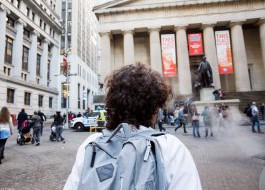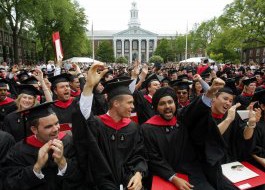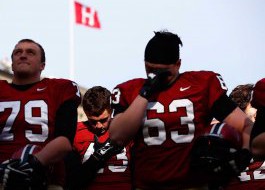
Each year, the New York Times puts out a call for college-admissions essays to the newest class of applicants who have written about issues of money, work, or social class.
In 2017, it chose four of the most poignant essays published them on its site to showcase the essays' power and honesty.
One of the essays comes from Zöe Sottile, a senior at Phillips Academy, who recalled the joy she felt at being admitted on scholarship to the elite Andover, Massachusetts boarding school, only to realize her status as a scholarship student set her apart.
"I was the only student from my public middle school I knew to ever go to an elite boarding school, and it felt like being invited into a selective club," Sottile wrote. "My first week at Andover, dazed by its glamour and newness, I fought my way to the financial aid office to pick up the laptop; I sent my mom a photo of me grinning and clutching the cardboard box," she continued.
All the free-tuition students were also given a Dell laptop for them to complete their work. Never before owning her own computer, she marveled at its "sleek edges" and "astonishing speed."
But Sottile realized that the Dell she lugged around marked her as an outsider. The students not on financial aid all used MacBooks.
"My laptop, which I had thought was my ticket to the elite world of Andover, actually gave me away as the outsider I was."
Yet Sottile found she was both an outsider among her wealthy classmates and with the students on financial aid. She grapples with this writing:
"But I also felt like an outsider going to meetings for the full-scholarship affinity group. My parents attended college and grew up wealthier than I did, giving me cultural capital many of my full-scholarship friends never had access to. Moreover, I'm white and could afford occasional concert tickets or sparkly earrings. The laptop, carried by all full-scholarship students and coded with hidden meanings, pivoted my friends' understandings of me. At home, I grew up middle class, then became the privileged prep school girl. But at Andover, suddenly, I was poor. Trying to reconcile these conflicting identities, I realized how complex and mutable class is. My class is connected to my parents' income, but it's also rooted in cultural knowledge and objects that are charged with greater meaning."
That realization forced Sottile to reflect and have a better understanding of herself, and others. "I am a full-scholarship student who benefits from cultural, socioeconomic and racial privilege: my story isn't easy, but it's still mine," she wrote.
You can read Sottile's essay, along with the other top three New York Times picks, here.




